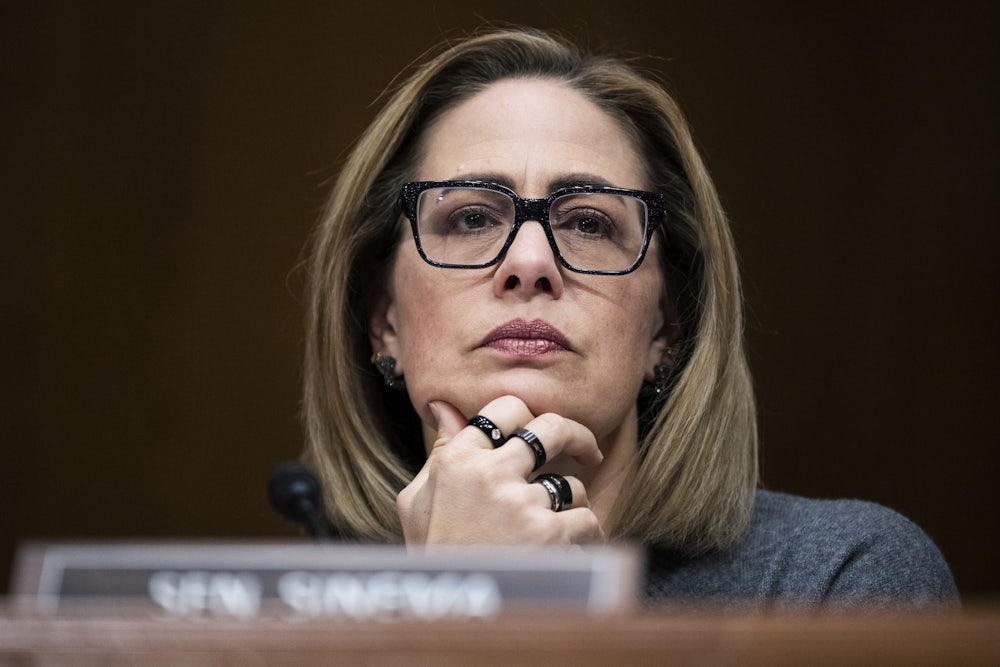Among the many lessons to draw from the Biden administration’s depositor bailouts of two failing banks is that too many Democrats let the banks boss them around.
Set aside the question of whether it was necessary for the administration to make depositors whole when Silicon Valley Bank and Signature Bank went bust. I don’t believe the failures of these midsize banks posed a systemic risk to the banking sector. But government regulators believed differently, and almost certainly they’d have done the same thing had a Republican been president.
The real question is whether these bank failures could have been prevented in the first place. The answer appears to be yes. This isn’t the Great Depression, or even the Great Recession; the broader economy is thriving, not failing. That suggests insufficient regulatory oversight. And as it happens, in 2018 Congress weakened regulation of midsize banks under the 2010 Dodd-Frank law, the first major overhaul of banking regulations since the Depression.
The main thing the 2018 rollback did was to raise, from $50 billion to $250 billion, Dodd-Frank’s asset threshold for banks whose potential failure was deemed a threat to the whole banking system. These “systemically important” banks are subjected to stricter federal oversight. They must undergo annual “stress tests,” with the Federal Reserve assuming the role of cardiologist. They must keep more cash in reserve in the event that someone like, say, Peter Thiel should decide abruptly to pull all his money out. And they should prepare “resolution plans,” commonly referred to as a “living will,” in the event of bankruptcy.
If these Dodd-Frank provisions are worth a damn, and if President Donald Trump and Congress had left well enough alone in 2018, they would have kept Silicon Valley and Signature from making the well-documented mistakes that caused them to go belly-up. The Congressional Budget Office warned Congress that the rollback bill would “increase the likelihood that a large financial firm with assets of between $100 billion and $250 billion would fail.” So did Bernie Sanders and Elizabeth Warren. Congress passed the bill anyway, 67–31 in the Senate and 258–159 in the House. Note the lopsided nature of the votes.
It’s no surprise that not a single Republican voted against the bill in the Senate and that only one, Representative Walter B. Jones of North Carolina, voted against it in the House. (Jones, a frequent Trump critic who opposed the 2017 tax cut because it increased the deficit, would die the following year from Lou Gehrig’s disease.) For all their blather about economic populism, Republicans still vote in lockstep with the banks except when they want to accuse them of being too “woke.” (The only Republican criticism thus far of the bank failures is that the banks were too darned focused on putting Black and LGBT folks on their boards. You can’t make this stuff up.)
But a lot of Democrats voted in 2018 with the banks too. The deregulation bill won 33 Democratic “ayes” in the House (including then-Representative Kyrsten Sinema of Arizona) and 16 in the Senate (including, of course, West Virginia’s Senator Joe Manchin, but also Colorado’s Michael Bennet, Virginia’s Tim Kaine, and Michigan’s Debbie Stabenow). Maine’s Senator Angus King, an independent who caucuses with the Democrats, also voted with the banks.
The Democrats received some cover from former Representative Barney Frank of Massachusetts, co-author of Dodd-Frank and, since 2015, a board member at Signature Bank, which has paid him $2.4 million over the past eight years.* Frank wrote an op-ed two months before the 2018 rollback. Even though the famously liberal Frank opposed the bill, he wrote that he favored raising the $50 billion threshold (to $100 billion, not $250 billion). This position, Frank maintained, predated his joining Signature.
Frank is, in my experience, pretty forthright, so I’m inclined to believe that he really did want to raise the threshold before he joined Signature’s board. And anyway, Signature’s assets when Frank came on board were well below even the $50 billion threshold. (They subsequently grew to $110 billion.) But on Monday Frank told The Wall Street Journal that “nobody has shown me any evidence of systemic or other kinds of fraud that would have been prevented” had the 2018 bill not been passed. That I find very hard to believe. It would be one thing if Frank were a dope, but he’s actually very smart. Though not, it would appear, quite so smart as Mary Miller, undersecretary for domestic finance under President Barack Obama and a fellow Signature Bank board member. Miller, the Journal said, “couldn’t be reached for comment.”
Warren and Representative Katie Porter of California introduced a bill Tuesday to repeal the 2018 rollback. Given the events of the past week, who on earth would defend keeping the asset threshold for strict oversight at $250 billion? Nobody, right? But as The American Prospect’s Robert Kuttner pointed out, not a single Democrat who voted for the 2018 bill is co-sponsoring Warren’s bill to claw it back. It isn’t clear that Biden will, even though he pledged Monday to “ask Congress and the banking regulators to strengthen the rules for banks to make it less likely that this kind of bank failure will happen again.” At a press gaggle Monday, press secretary Karine Jean-Pierre didn’t answer when asked whether that meant Biden would move to lower the $250 billion cap.
Well, that’s politics, you say. Except it isn’t. A November poll by the Pew Research Center surveyed liberal Democrats, conservative Republicans, conservative/moderate Democrats, and moderate/liberal Republicans about whether banks and financial institutions had a positive or negative impact on the country. Except for the conservative/moderate Democrats, all said they had a negative impact. (Among conservative/moderate Democrats, it was a wash.) Banks fared worse in the survey than tech companies, small businesses, and labor unions; only large corporations scored worse. The groups that held banks and financial institutions in the greatest disdain were liberal Democrats (65 percent said they had a negative impact) and conservative Republicans (60 percent).
It isn’t politics, it’s money. Republicans receive more in political contributions from banks than Democrats, of course. The pattern was particularly lopsided from the mid-1990s to the mid-2010s. But beginning in 2016, these contributions started evening up, and by 2020 Democrats were getting $26 million to the Republicans’ $29 million. The gap widened again in 2022, but Democrats still got 40 percent of the haul. Fox News reported Wednesday, with great delight, that Silicon Valley Bank and Signature gave more to Democrats than Republicans in recent years. That’s not quite right; in the 2022 cycle, Signature gave Democrats only 40 percent. But, yes, Silicon Valley gave Democrats 77 percent, and in 2020 it gave Democrats an astounding 96 percent, while Signature gave Democrats 59 percent.
The banking sector is no doubt gratified by Biden’s actions this week. That doesn’t mean Biden was wrong to bail out the depositors. But if the Democrats follow through by passing Warren’s bill, bankers will fall out of love with Democrats, which is as it should be. Congress will have made banking safer, but bankers don’t value safety. If they did, we wouldn’t be here.
* This article originally misidentified Frank as an “ex-Republican” instead of an “ex-Representative.”






